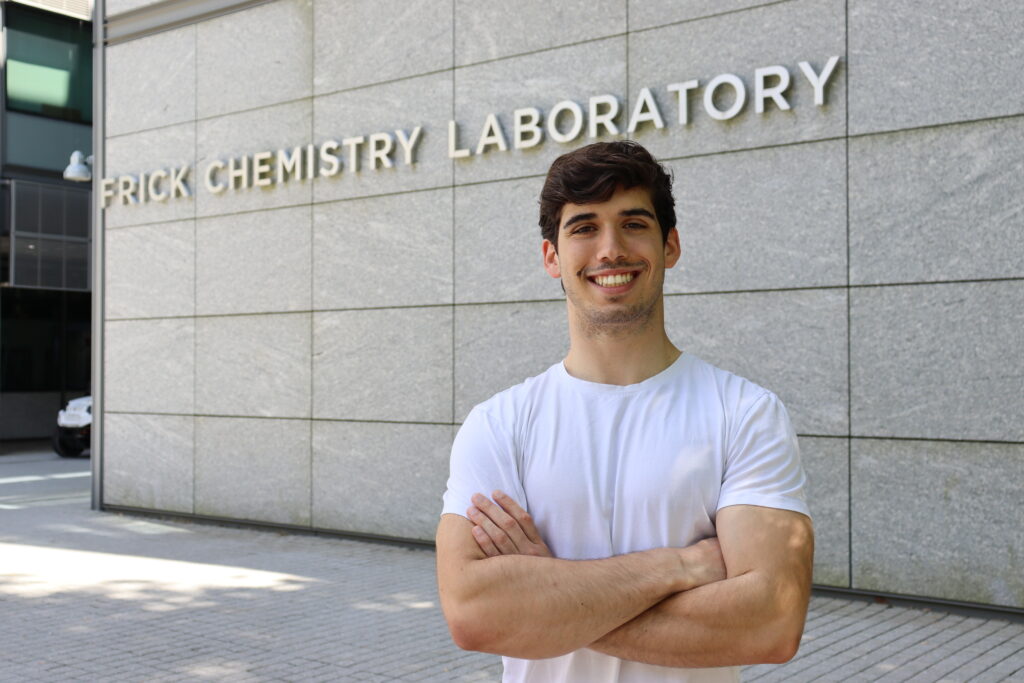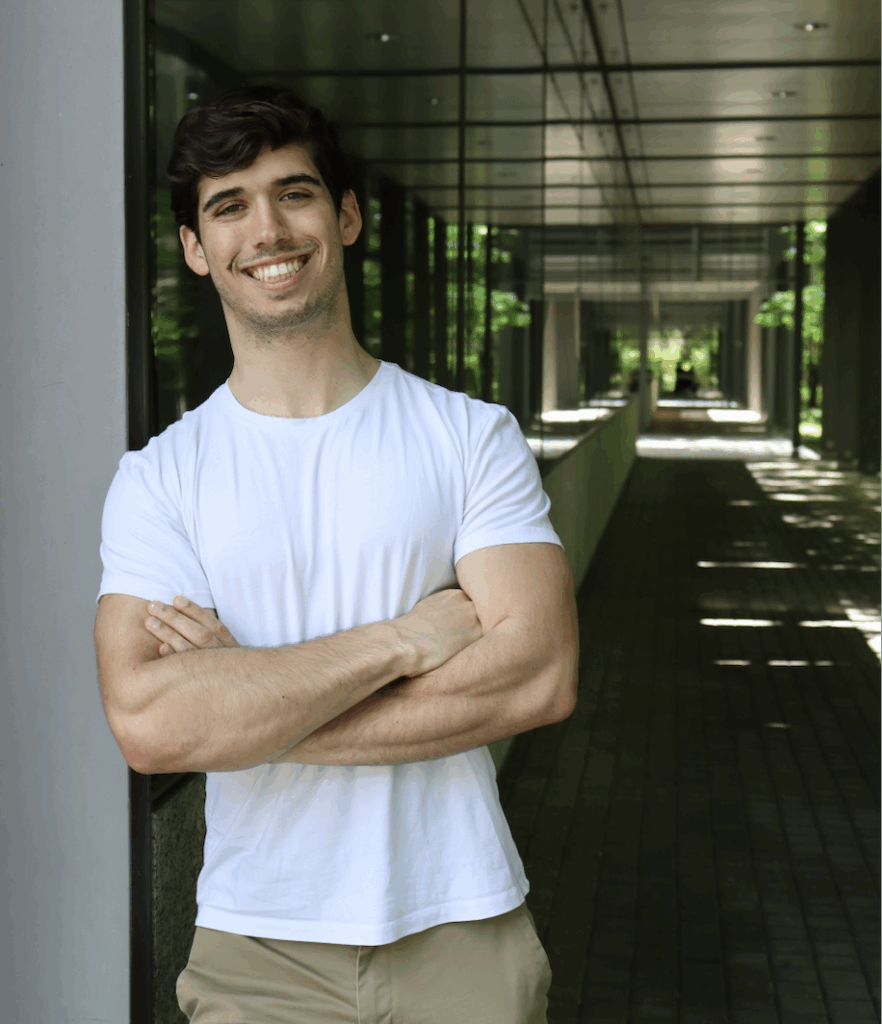Erik Medina: chemistry major and Class of 2025 valedictorian

Theoretical physics. Marine biology. Anesthesia. Erik Medina’s scientific interests were spinning through his mind even before he came to Princeton in the Fall of 2021. But a Junior Colloquia Lecture featuring Assistant Professor of Chemistry Erin Stache ignited a fascination with organic chemistry and plastic upcycling: “In general, growing up in South Florida, plastic pollution is something that is very evident the moment you get to the beach.” Medina subsequently got an assignment in the Stache Lab, where he enjoyed the rare achievement of co-authoring a journal paper as an undergraduate.
On Tuesday, May 27, Medina will deliver remarks at the Princeton University Commencement as the valedictorian for the Class of ‘25. Ahead of that celebration, we interviewed the Coconut Grove, Florida native about his work and his ambitions.
WERE YOU SURPRISED TO FIND YOURSELF DRAWN TO CHEMISTRY?
I was very much a rocks-and-dinosaurs kind of kid, so I don’t know that I ever strayed very far from that. There was a phase that I went through in middle school where I wanted to be a theoretical physicist and I was obsessed with particle physics and learning all the different standard model particles and things. But at some point, I realized I probably wasn’t good enough at math to be a theoretical physicist. So I ended up venturing into chemistry a little bit and got really hooked on the behavior of the elements.
WHY ORGANIC CHEMISTRY?
One of the things was the synthetic problem solving, in the sense of there’s a well-defined question that we want to answer. There are very tangible goals and that’s something that’s attractive to me as a scientist. The other aspect is that I found the physical aspect of it—the physics, the quantum mechanics and the thermodynamics behind it—completely fascinating. How two molecules interact is so fundamental to everything we do but it’s so very different at the same time from what we observe on the macro-scale, in the world. And that was something that also really excited me.

As Class of '25 valedictorian, Medina will present remarks at the Princeton University Commencement on May 27th.
WHAT WAS IT LIKE TO CO-AUTHOR A PAPER IN THE JOURNAL OF THE AMERICAN CHEMICAL SOCIETY?
It was a really pleasant surprise. I didn’t expect it to work out as nicely as it did. There were periods in the project where it was very much a slog, and so just trying to push through those hurdles made it very rewarding in the end. I think I more generally am very excited that there are people like us doing this kind of research to tackle these big, real-world problems like plastic recycling. This isn’t us just sitting idly by. We’re being proactive in trying to control the problems with plastics.
YOU’RE TAKING A YEAR OFF TO TEACH AT YOUR FORMER HIGH SCHOOL?
I was born and raised just outside of the City of Miami. It was a great experience, very cool to grow up in a city that was so diverse culturally and where there are so many different people from all over the world. My entire family still lives there. Why am I going back? First and foremost, I really enjoy teaching. It’s something that I’ve always been interested in, partly because my mom’s a primary school teacher. There’s nothing more human than passing on what you’ve learned. Part of the reason that we’ve had such success as a species is because we do that. So, ever since I was in high school, I was very involved in peer tutoring and things like that. And then once I started becoming a course assistant for organic chemistry here and helping with the precepts, I realized just how much I really did enjoy doing it and I would love to teach as a career.
HOW WILL YOU TEACH THE DIFFICULT SUBJECT OF CHEMISTRY SO THAT IT ENGAGES STUDENTS?
What I really want to convey to students is that there’s something fundamentally human about curiosity and about wanting to understand the world, and chemistry in particular is an excellent avenue to do that. It’s so integrated into every other field of human understanding, knowledge, and science. Physics, biology — all these things are fundamentally linked to some chemical process. It’s a great way to understand the world at a deep level. I think if you can show people that and give real, concrete examples of things they would be interested in, that goes a long way.
YOU’RE HEADED OFF TO GRAD SCHOOL AFTER TEACHING?
Yes, I’ll be pursuing a doctorate at the University of Wisconsin-Madison.
DO YOU HAVE ANY TIME MANAGEMENT TIPS TO SHARE?
Time management is very difficult. It’s not something I’ve always done well. I think that I’ve been good at making sacrifices in order to prioritize school or prioritize research. Obviously, those were personal decisions and not always easy. But as far as getting things done, I follow the in-the-moment model. Okay, you need to do something? Let’s just do it right now. Because if I procrastinate until the last minute, I’m going to freak out about it later. It hangs over you. Over time, I’ve learned that it just needs to get done now so just get it done now. That’s something that’s served me well. Unfortunately, there are only 24 hours a day, and if I get less than six hours of sleep a night, I’m very grumpy and unproductive, so I was always a bit constrained by that. Ultimately, I think time management boils down to finding what is important to you and making it a priority.
DO YOU HAVE VALEDICTORIAN SPEECH THEME YET?
Something that is important to me personally, that I really want to get across to the student body, is that being valedictorian is a big deal but there’s nothing really different about me than anyone else. I really am a normal person, and a lot of the things I’ve struggled with a lot of other people have struggled with, too. It’s a shared experience. And I hope that some of the lessons I’ve learned along the way will be important to share with other people.
